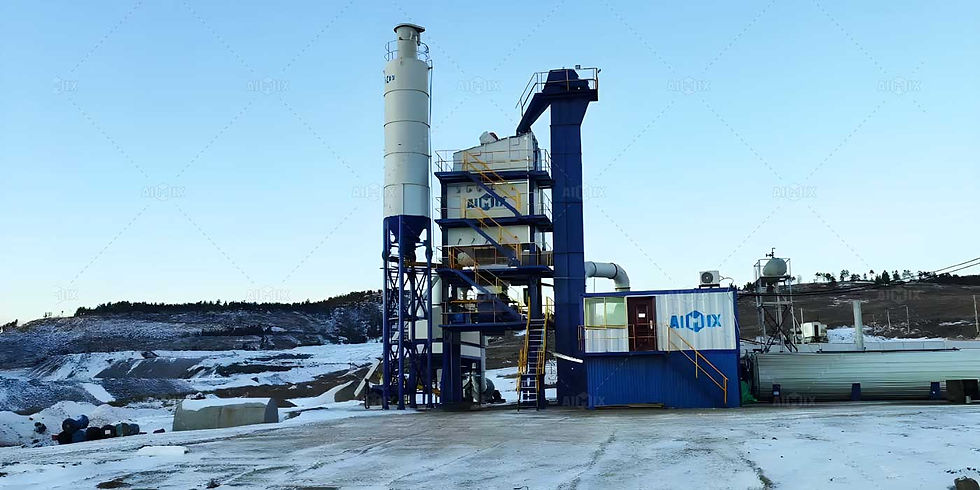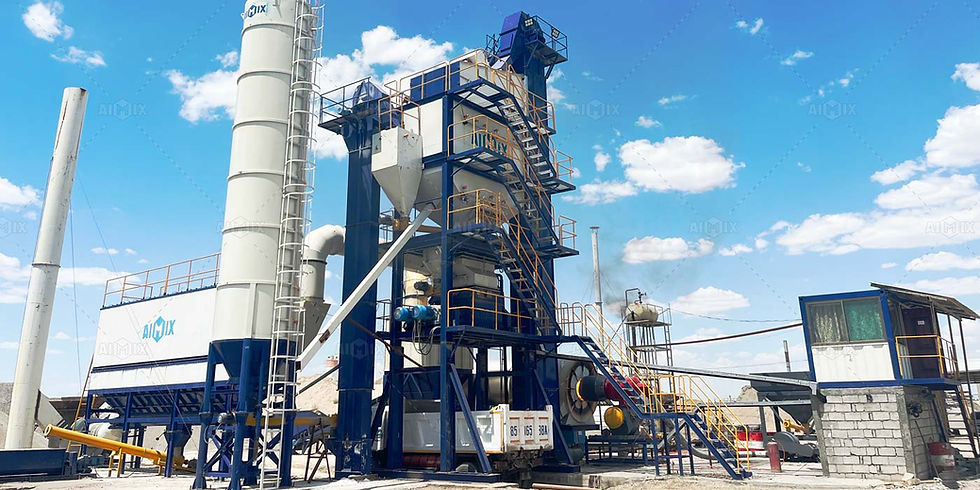What’s the Best Asphalt Plant for Contractors Producing Asphalt Mix for Their Own Roadwork?
- aimixglobal5
- Apr 17, 2025
- 4 min read
When contractors are tasked with producing asphalt mix for their own roadwork, choosing the right asphalt plant is critical. The plant’s performance, efficiency, and adaptability can significantly influence the success of a project. But with so many options available, how can you determine which one is the best for your needs? In this article, we'll explore the key factors to consider when selecting asphalt mixing plants, ensuring you make an informed decision that aligns with your project requirements.

Understanding Your Asphalt Production Needs
The first step in choosing the best asphalt plant is understanding your specific production needs. Do you need a plant that can produce a variety of asphalt mixes for different types of projects? Or is your focus on high-volume production for a single road construction job? Knowing the scope of your work will help narrow down the options to those that best fit your needs.
For contractors focused on roadwork, the ability to produce consistent, high-quality asphalt mixes is paramount. A reliable plant that can handle the demands of your project without frequent maintenance interruptions will save you time and money in the long run.
Portable vs. Stationary Asphalt Plants
One of the first decisions to make is whether you need a portable or stationary asphalt plant. Both options come with their own set of advantages and disadvantages, so it’s essential to assess which suits your operational style.
Portable Asphalt Plants
Portable asphalt plants are ideal for contractors who need flexibility. These plants can be easily moved from one job site to another, making them perfect for projects that require mobility. If you're working on multiple roadwork projects or need to relocate your operations frequently, an asphalt mixing plant portable offers the versatility you need.
Stationary Asphalt Plants
On the other hand, stationary asphalt plants are better suited for contractors who have a fixed location for their asphalt production. These plants tend to have higher production capacities and are designed for long-term, consistent operation. If you’re handling large-scale projects or need to meet strict production targets, a stationary plant might be the right choice.
Both types of plants offer high-quality production, but choosing the one that aligns with your project scope and workflow is key.

Key Features to Look for in an Asphalt Plant
Whether you choose a portable or stationary asphalt plant, certain features can enhance your efficiency and help optimize your production process. Here are the key features to consider:
Production Capacity
The production capacity of an asphalt plant will directly affect the timeline and efficiency of your project. A hot mix plant with higher capacity will allow you to meet larger demand quickly, reducing downtime and speeding up the overall construction process. If you expect high traffic volumes or large-scale infrastructure development, it’s crucial to opt for a plant that can handle your production needs.
Mix Quality Control
For contractors producing asphalt mix for their own roadwork, consistency in mix quality is critical. An asphalt plant equipped with advanced mixing technology ensures that each batch of asphalt meets the desired specifications. Look for plants that feature precise controls, allowing you to adjust the mix to meet the requirements of different types of roadwork.
Maintenance and Durability
Asphalt plants are heavy-duty equipment, and like all machinery, they require regular maintenance to ensure smooth operation. However, some plants are designed for easier maintenance, reducing the time and effort needed to keep them in top working condition. Look for plants made with high-quality materials that are built to last, minimizing the need for costly repairs.
Energy Efficiency
Energy efficiency is another important consideration, as asphalt production can be energy-intensive. Plants that use energy-saving technologies, such as efficient burners and heat recovery systems, can significantly reduce operational costs. In an industry where margins are often tight, reducing energy consumption is a valuable way to keep costs under control.

Choosing the Right Asphalt Plant for Your Roadwork Project
After evaluating your needs and the features that matter most, it’s time to choose the asphalt plant that’s the best fit for your project. The right plant will not only help you meet production demands but also ensure that your asphalt mixes are of high quality, delivered on time, and within budget.
For contractors involved in roadwork, the ideal asphalt plant should offer a combination of flexibility, efficiency, and durability. Portable plants are perfect for smaller, temporary jobs, while stationary plants excel in long-term, high-volume production. Ultimately, your choice will depend on your specific project needs, budget, and operational style.
Conclusion: Invest in the Best Asphalt Plant for Long-Term Success
Choosing the right asphalt plant is an investment that will pay off over the long term. Whether you opt for a portable or stationary model, the right plant will help you achieve consistent quality, improve efficiency, and meet your project deadlines. When evaluating your options, prioritize reliability, production capacity, and ease of maintenance.
If you're still unsure about which asphalt plant is the best fit for your roadwork project, consider consulting with an expert who can help guide you through the selection process. Investing in the right equipment will set you up for success, ensuring that your asphalt production is smooth and efficient from start to finish.
Need help choosing the perfect asphalt plant for your roadwork? Contact us today to discuss your needs and get expert advice tailored to your project requirements!



Comments